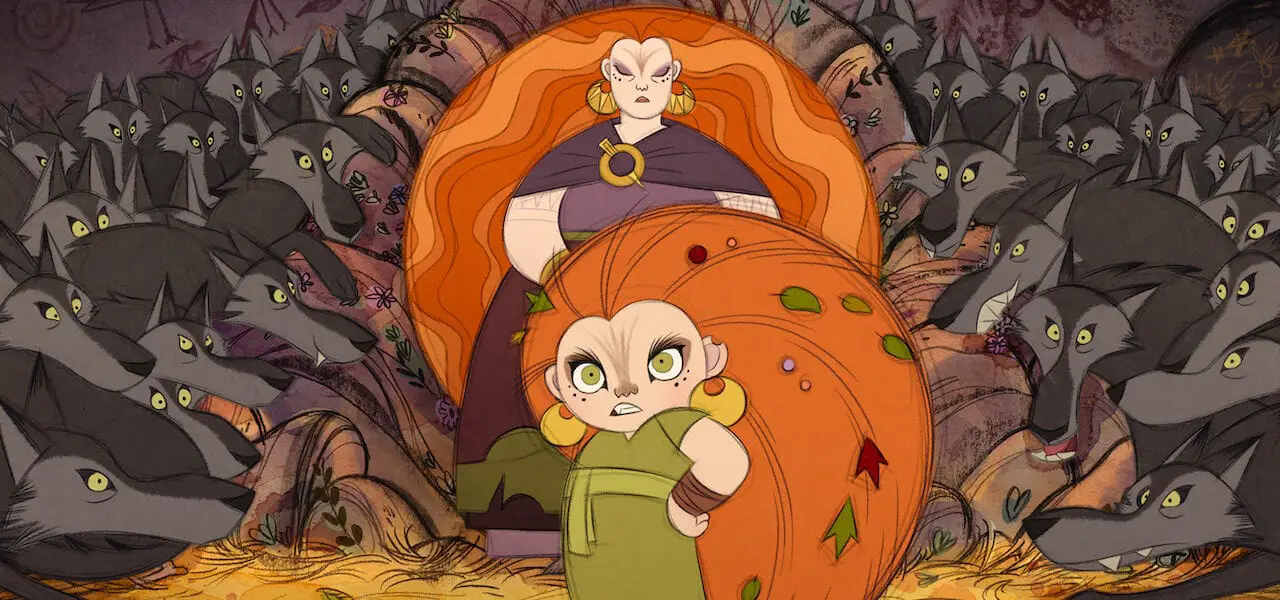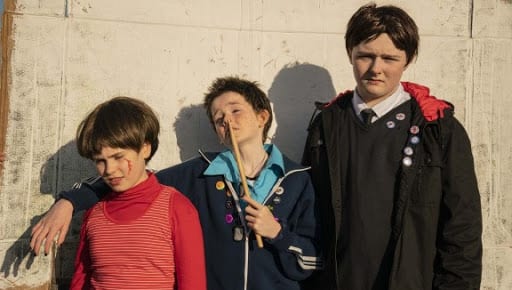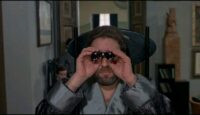One week into the virtual press screenings, despite circumstances, we’ve been treated to some phenomenal films at this year’s London Film Festival. Particular highlights so far have included Phyllidia Lloyd’s equally devastating and uplifting feminist drama Herself, Harry McQueen’s soul-shaking confrontation with mortality Supernova, Josephine Decker’s delirious bio-drama Shirley, Steve McQueen’s urgent and electrifying Mangrove, Miranda July’s quirkily romantic indie Kajillionaire and a deeply moving array of documentaries like Time, Bloody Nose Empty Pockets, and The Painter and the Thief. Reviews of all these films and more are available to read on this site in earlier entries in this series, and as we enter the second week of press screenings and the festival gets well underway, we still have some exciting releases ahead.
Wolfwalkers
One of the Festival’s most eagerly anticipated releases for me was always going to be Wolfwalkers, the new film from Cartoon Saloon, the creatives behind beautiful animations Song of the Sea, The Secret of Kells and The Breadwinner, works which combined a stunning and unique art style with tender and mature stories of the adult world through child’s eyes. After a week of earnest documentaries, social dramas and arthouse offerings, I can’t tell you how ready I was to let myself sink back into another of their endlessly enchanting worlds of rich, childlike Celtic wonder. It also pleases me no end to report that Wolfwalkers is close to Cartoon Saloon’s best work yet, equal parts dark and jubilant, it’s a spellbinding riff on Irish folklore that shares more than a little DNA with Studio Ghibli’s masterpiece Princess Mononoke.
Living in a fantasy variant of colonial Ireland in 1650, young maiden Robyn dreams of following her father on a wolf hunt in the perilous woods outside the city gates. However, when she defies his instructions and follows him, she discovers a secret, and a friendship that turns her world upside down. She meets Mebh, a young girl living in the woods with the wolves, who are far from the malevolent force she had been raised to believe, and what unfolds is an exciting and moving battle between rules and freedom.

As much as ever with Cartoon Saloon, the visuals are simply stunning. Every pencil line and even guide line is visible in a flat two-dimensional style that pays homage to contemporary wood-cutting. The sharp, claustrophobic edges and angles of the town clash against the graceful, undulating curves of the forest, beautifully expressing the film’s conflict. The colours do similarly, with the cold and muted greys of the urban environments set against the verdant, warming autumnal radiance of the forest. The character designs, particularly on Robyn and Mebh are terrific too, one curious and refined, the other a blazing teardrop of tangled hair, and the voice work on both characters from Honor Kneafsey and Eva Whittaker is superb. The designs and voices on the supporting characters are admittedly less inspired, but they get the job done, and the music by Bruno Coulais and Kila is as beautiful as ever.
It may seem silly to single out a family fantasy as one of the festival’s biggest highlights, but there hasn’t been an experience more nourishing to the spirit all week. Wolfwalkers is another thrilling, warming and deeply moving fantasy adventure, filled with gorgeous sights and sounds for the whole family, and if there’s any justice it’s destined to become a future children’s classic.
Sound For the Future
A premiere for the festival, Sound For the Future may also have a shot at the title for its strangest release. Directed by Matt Hulse, Sound For the Future is a documentary of the formation of “Britain’s first post-punk band”, The Hippies, which was formed by Matt and his siblings in 1979, when he was eleven, and they were eight and twelve respectively. They sung songs about Rabies and the assassination of John F. Kennedy that sound not unlike what The Clash would be doing some years later on their Cut the Crap record, and their mascot was Spoons, Matt’s snoopy doll.
To account for the lack of archive footage for the band, Matt and his crew auditioned local children to play him and his brother Toby and sister Polly, and reconstruct Matt’s memories of the era. The ideas contributed by the generally bemused young actors were incorporated liberally into the film, maintaining the atmosphere of childish creativity of the music. None of their ideas are as bizarre as those brought into the picture by Matt himself though, who comes off as a wonderfully characterful aging punk weirdo.

Through it all, the film achieves a tone halfway between an obscure underground alternative comedy open mike night and a modern art documentary. However, despite how funny it is, particularly in its opening act as the audience gets as much of a bearing as they’re going to have, by the third act it’s developed a surprising depth of feeling. Matt’s ironic attempts to recapture the lost feeling of freedom and innocence from his childhood slowly develop into an uncomfortable personal exploration of his childhood separations, between his parents, himself and his mother, and his suspiciously absent brother Toby. It’s a surreal and off the wall piece, powered wholly by a dry wit and big heart, that viewers may find both hilarious and deeply moving if they go in with the right attitude.
Wildfire
Returning to wolves in Ireland, we have Wildfire, a fiercely defiant portrait of sisterhood set against a backdrop of the legacy of sectarian violence and anchored by two tragically splendid performances. The film opens with footage reminiscent of the prologue of La Haine, with newsreel of street clashes between police and protesters giving way to footage of terrorist attacks. The film gives audiences a succinct summary of the history of the disputed Irish border, the Good Friday agreements which saw many former terrorists back on the streets, and the re-ignition of uncertainty following Brexit. All this provides the setting more than the theme for Wildfire’s story though. There are glimpses of ideas of showing a woman’s perspective on such conflicts that we saw earlier in the festival with Shadow Country, but this is a tangential element to the film.

The central theme actually has a surprising amount in common with Wolfwalkers, to which this might almost be seen as an adults only counterpart. Kelly (Nika McGuigan) returns home to Ireland after an unexplained year long absence, to find her sister Lauren (Nora-Jane Noone) only now putting her life back together after her disappearance. As the two women attempt to re-establish their sisterly connection, it seems to come at the cost of their connections with those around them, as the stigma of mental illness seems to hang over their family since the death of their mother years before. The scene where the two women drunkenly dance together plays like a cross between an animal mating ritual and a territorial dispute between feral cats.
As the two women retreat further into their own personal history, the surrounding town seems ever more hostile and cruel, and the shadow of Thelma and Louise begins to steal into the film as the two women find themselves fighting desperately to hold onto their independence in the face of social stigma, division and misunderstanding. Their perspective becomes maddeningly addictive as the film goes on, their decisions easily relatable and their connection frighteningly strong. The film was the final role of actor Nika McGuigan who passed away last year, and her last performance here could not have been bettered. She and Noone have an incredibly natural and moving chemistry and their relationship is a sturdy mast that carries the film forward with sensitivity and primal urgency.
Genus Pan
If a film like Wolfwalkers was nourishing to the spirit, then Genus Pan was an emetic. It’s safe to say that the emotional high I was on at the start of the film was thoroughly purged by two and a half hours later. I wouldn’t describe the film as a failure, but the films of Lav Diaz are most certainly not for the impatient or the delicate of heart. His films firmly belong to a tradition that has come to be known as ‘slow cinema’, films shot in as close to a one to one ratio of shots to scenes, without non-diegetic scores, excessive editing, camera movement, close ups or even often, as here, colour.
These techniques are all supposedly designed to call the viewer’s attention to the fact they are watching a constructed reality, however I’ve seen them all used for the exact opposite purpose, to create a sense of realism. It seems likely the former here, as there are other elements such as the absence of certain sound effects, and even missing audio, that could only be an intentional attempt to draw the viewer into an acknowledgement of the construction of the reality they are witnessing. However they are intended, they nearly always result in films that seem to be asking audiences to make of them what they will, and help the viewer as little as possible.
This kind of Brechtian alienation is always a difficult sell for me, as not pulling you into the reality you are being shown is precisely what a bad film does. So it’s always hard to restrain my knee jerk response that if a film is not engaging me, then its failing. Of course, all films seek to engage viewers and slow cinema is no different, it just seeks a different kind of engagement, a purely unemotional, intellectual one, and on this level, Genus Pan is indeed intermittently successful.
The film is divided into two distinct halves, the first, and far more enjoyable one, follows a trio of miners as they trek home through the jungle, and the second explores the tragedy that unfolds once they arrive. These three men are Andres, Baldo and Paolo, and their scenes together find the film at its most accessible and enjoyable. Reminiscent almost at times of Tarkovsky’s Stalker, the three bicker, argue and encounter various phenomena, each responding differently. Andres is young, brash and idealistic, Baldo is greedy and cantankerous and Paolo is religious, tempered and diplomatic. The three have a very compelling chemistry and between them make an intriguing and engaging exploration of the film’s themes. It’s only in the second half that the film becomes truly black and white and a legitimately depressing experience.
The title is inspired by a pseudo-scientific theory quoted in the film, that some humans have an underdeveloped chimpanzee-like brain, leading them to be selfish and violent. The first half of the film seems to dispute such a notion, suggesting that we are all capable of great evil and great altruism, while the second half seems to divide humanity more or less along clear lines of good and evil. All this is structured and contextualised as an attempt to understand the massive corruption and violence throughout Pilipino society.
As much as I respect and understand this endeavour, and sympathise with the themes of Genus Pan, I can’t say that I found it the most enlightening or insightful meditation on them that we’ve seen. From among the films already screened as part of this festival, I would cite the aforementioned Shadow Country as a more effective and comprehensive study of mankind’s inhumanity. I could take issue with both its methods and its conclusions, but I don’t feel strongly enough to tear into either. Genus Pan was a somewhat rewarding experience, but not one I would recommend to most audiences.



